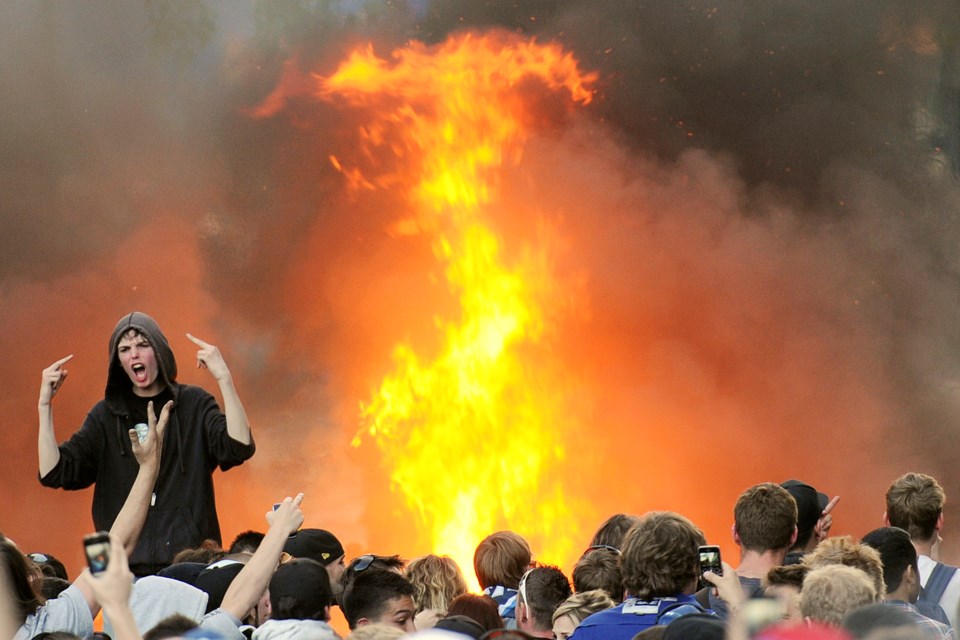It cost $4.9 million to prosecute 300 people charged in the riot that erupted downtown in June 2011 after the Vancouver Canucks lost Game 7 to the Boston Bruins in the Stanley Cup Final played at Rogers Arena.
That cost, along with details of an unprecedented investigation and results of court proceedings, are contained in a report released Monday by B.C.’s Prosecution Service, which required more than 500 court days to complete trials and sentencing hearings.
“[In summary], the police and the prosecution service expended considerable resources to ensure that those who participated in the Vancouver 2011 riot were held to account,” the report concluded. “Hopefully, this prosecution will deter – even prevent – the reoccurrence of events like the 2011 riot, as those who would riot and commit other crimes under cover of a crowd now know they do so at their peril.”
The majority of the $4.9 million was spent on staff ($4.8 million) and the remainder ($170,699) covered costs related to witnesses, travel, transcripts, cellular phones, office expenses, building charges and Law Society fees.
The Crown’s work resulted in 912 charges approved against 300 alleged rioters, 246 of whom were adults and 54 youth. In the end, 284 pleaded guilty, 10 chose to go to trial (nine were convicted) and the Crown entered a stay of proceedings against six people. Only 17 per cent of persons charged in the riot had a criminal record.
The report said 94 per cent of the adults were sentenced for their crimes, with 47 per cent of those serving time in an institution. Another 47 per cent were given conditional sentences. Of the youth, two per cent went to jail and 17 per cent received a sentence to be served in the community under what’s called a deferred custody and supervision order, which comes with conditions.
“The conditions restrict the liberty of the offender,” the report said. “If an offender disobeys any of the conditions, the judge can order the offender to serve a portion of the remaining sentence or the whole of the remaining sentence in an institution. The remaining adults and youth offender were sentenced to community supervision.”
Much of the Crown’s work, which the report described as labour intensive, involved reviewing video and photographic evidence. Police collected 402 video and photo exhibits from 304 sources. That translated to 5,500 hours of video and almost 30,000 photographs, totaling more than 30 terabytes of data. That’s the equivalent of 7,500 DVDs, or 45,000 CDs. In comparison, the 1994 Stanley Cup riot in Vancouver produced 100 hours of evidence.
“The vast majority of the riot-related accused pleaded guilty due to the organized and compelling Crown case, in particular the photographic evidence,” the report said. “The countless hours spent by the [prosecution team] organizing this evidence [and by the police in carefully gathering and cataloguing this evidence] resulted in great savings in court time.”
The riot broke out on the evening of June 11, 2011, turning the downtown into an atmosphere of lawlessness, destruction and violence that 928 police officers eventually brought under control. Fires were set, 122 vehicles were damaged or destroyed and 52 assaults were reported against citizens, police and other emergency personnel.
The rampage caused $2.7 million in damages to businesses, $540,000 to citizens and $525,000 to the City of Vancouver, B.C. Ambulance Services and St. Paul’s Hospital. London Drugs and its neighbour, Hudson’s Bay, were at the epicentre of the riot and sustained extensive damage and lost hundreds of thousands of dollars in merchandise.
What the prosecution team’s report couldn’t capture as a cost was the psychological impact on people caught in the riot.
“Some people were terrified of losing their lives, having barricaded themselves inside businesses for safety, while others defended property or other persons at risk to themselves,” the report said. “The riot stripped a sense of safety and security from many citizens.”
@Howellings



